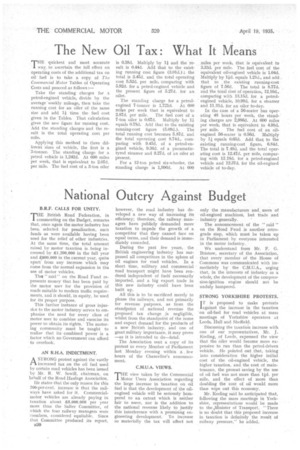National Outcry Against Budget
Page 30

If you've noticed an error in this article please click here to report it so we can fix it.
B.R.F. CALLS FOR UNITY.
THE British Road Federation, in commenting on the Budget, remarks that, once again the motor industry has been selected for penalization, such funds as were available having been used for the relief of other industries. At the same time, the total amount raised by motor taxation is being increased by £1,200,000 in the full year and £800,000 in the current year, quite apart from any increase which may come from the normal expansion in the use of motor vehicles.
Thal " raid " on the Road Fund represents money that has been paid by the motor user for the provision of roads suitable to modern traffic requirements, and it should, in equity, be used for its proper purpose.
This further instance of gross injustice to the motor industry serves to emphasize the need for every class of motor user to combine and exercise its power to obtain its rights. The motoring community must be taught to realize that its combined power is a factor which no Government can afford to overlook.
AN R.H.A. INDICTMENT.
A STRONG protest against the vastly increased tax on the oil fuel used by certain road vehicles has been issued by Mr. R. W. Sewill, chairman, on• behalf pf the Road Haulage Association.
He states that the only reason for this 700-per-cent increase is that the railways have asked for it. Commercialmotor vehicles are already paying in taxation about £5,000,000 per year more than the Salter Committee, of which the four railway managers were members, considered equitable. Since that Committee produced its report, however, the road industry has developed a new way of increasing its efficiency; therefore, the railway managers have publicly demanded more taxation to impede the growth of a competitor that they cannot face on equal terms, and their demand is immediately conceded.
During the past few years, the British engineering industry has surpassed all competitors in the sphere of oil engines for road vehicles. In a short time, military and commercial road transport might have been rendered independent of fueld necessarily imported, and a big export trade in this new industry could have been built up.
All this is to be sacrificed merely to please the railways, and not primarily for revenue purposes, as from the standpoint of national revenue the proposed tax change is negligible, whilst from the standpoint of the home and export demand for the products of a new British industry, and one of great military importance, it may prove —as it is intended to do—fatal.
The Association sent a copy of its protest to every Member of Parliament last Monday evening within a few hours of the Chancellor's announcement.
C.M.U.A. VIEWS.
THE view taken by the Commercial Motor Users Association regarding the large increase in taxation on oil fuel is that the development of the oilengined vehicle will be seriously hampered to an extent which is neither fair to users, nor is the addition to the national revenue likely to justify this interference with a promising engineering development. To increase so materially the tax will affect not
only the manufacturers and users of oil-engined machines, but trade and industry generally.
The announcement of the " raid" on the Road Fund is another retrograde step, which must be taken up in Parliament by everyone interested in the motor industry.
We understand from Mr. F. G. Bristow, secretary of the Association, that every member of the House of Commons was communicated with immediately by the C.M.U.A., urging that, in the interests of industry as a whole, the development of the compression-ignition engine should not be unduly hampered.
STRONG YORKSHIRE PROTESTS.
I T is proposed to make protests against the increase in the taxation on oil-fuel for road vehicles at mass meetings of Yorkshire operators at Leeds, Hull and Sheffield.
Discussing the taxation increase with one of our representatives, Mr. J. Keeling, of Leeds, expressed the view that the oiler would become more expensive to run than the petrol-driven vehicle. He pointed out that, taking into consideration the higher initial cost of the oil-engined vehicle, the higher taxation, and the cost of maintenance, the present saving by the use of oil fuel was not more than lid. per mile, and the effect of more than doubling the cost of oil would more than wipe out this economy.
Mr. Keeling said he anticipated that, following the mass meetings in Yorkshire, representations would be made to the ,Minister of Transport. "There is no doubt that this proposed increase in taxation is definitely the result of railway pressure," he added.




















































































